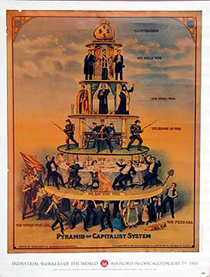So Few Leaders ... so few problem-solvers ... lift a brew to two who think different
Got this newsletter from pragmatic progressive thinker, Matt Miller. So little leadership in elected officialdom, much less corporate America (greedy bastards). So I hereby salute Howard Schultz and Jim Sinegal for joining the very small and elite group that includes the founders of Ben & Jerry's, mega-billionaire George Soros, and a handful of others for proving that profit does not need to come at the expense of human beings.
7/26/06
Matt Miller's new Fortune column:
THE SENATOR FROM STARBUCKS
On a freezing winter day in 1961, 7-year-old Howard Schultz came home from school in Brooklyn to find his parents in tears. His dad, a deliveryman, had broken his ankle and was out of a job, with no health insurance.
His family's fear scarred Schultz. Later, as he grew Starbucks, he vowed to build "the kind of company my father never got a chance to work for." Schultz was a leader in offering comprehensive benefits to part-timers - and the loyal talent Starbucks has thus attracted, he says, has been central to its success.
Now Starbucks' benevolent coffee republic is at risk. Like every business, it has seen double-digit increases in health costs. But the trouble goes beyond spending. "We can't be the kind of society we aspire to be when we have 50 million people uninsured," Schultz says. "It's a blemish on what it means to be an American."
And so Schultz has reached out to like-minded leaders, like Jim Sinegal of Costco, who also gives benefits to part-timers. Both men asked, What if this benefit becomes unsustainable?
Reneging wasn't an option; they'd do whatever it took to keep their commitment to employees. Starbucks launched a wellness program it hopes will deliver long-term savings, and raised prices partly to fund rising health costs. Yet those measures struck Schultz as Band-Aids.
Why should health coverage depend on whether your company can charge extra for a latte? Many companies can't make this math work. Meanwhile, in the 36 other countries where Starbucks operates, health care is basically funded by the government.
Such questions led Schultz to make the rounds in Washington, but he came away discouraged. "It's all great when you're there," he says. "Then you leave, and nothing happens." His next idea was to convene a summit on CNBC to call attention to the issue. He pulled it off late last year - barely.
"It wasn't easy to get CEOs to appear publicly on this issue," Schultz says. A few CEOs came, but one withdrew even after agreeing to join. "I just can't be out front on this," he said.
I ask Schultz why CEOs are so timid. He sips his coffee (a rare Ethiopian blend from his chairman's stash). "It's the cloud Hillary created when she tried to change the system," he says. "People burned her so badly, and everyone remembers that. It's a subject people don't want to touch."
But necessity can trump fear. And as more CEOs realize that nothing they do inside their firms can fix what ails health care, the shadow Senator from Starbucks is well positioned to catalyze the business-led conversation we need.
CEOs don't need a full-blown agenda to transform the debate. Look at the headlines Lee Scott of Wal-Mart generated a few months back merely by saying the obvious in a speech: Health care is a problem that business and government need to tackle together.
CEOs should seize the opening provided by labor leader Andy Stern when he says employer-based health care is dead. GM's Rick Wagoner, who tiptoed around such elephants in the room in Senate testimony the other day, still doesn't get what this moment requires.
But imagine that Schultz and a few other heavy-hitters join hands at the National Press Club, not only to declare that health care is in crisis but to offer a short list of principles to guide the debate.
At Fortune's Brainstorm conference in Aspen in July, I floated this idea along with three principles such a group might start with:
(1) all Americans should have basic health coverage,
(2) none should have to spend more than 10% of their income on medical expenses, and
(3) business should be insulated from excess health inflation to remain competitive.
Top executives from Pfizer and McKesson, along with AARP's Bill Novelli and Stern himself, said they'd sign on to something like this in a flash.
Memo to Schultz: Convene this group and you'll force both political parties to (finally) get serious as we head toward 2008. It's doable. And it's time.
[PAST TIME; my note & emphasis.]
***************
Matt Miller is a senior fellow at the Center for American Progress and the author of "The 2% Solution: Fixing America's Problems in Ways Liberals and Conservatives Can Love."
Listen to Matt's NPR radio show, "Left,Right & Center"







0 Comments:
Post a Comment
<< Home